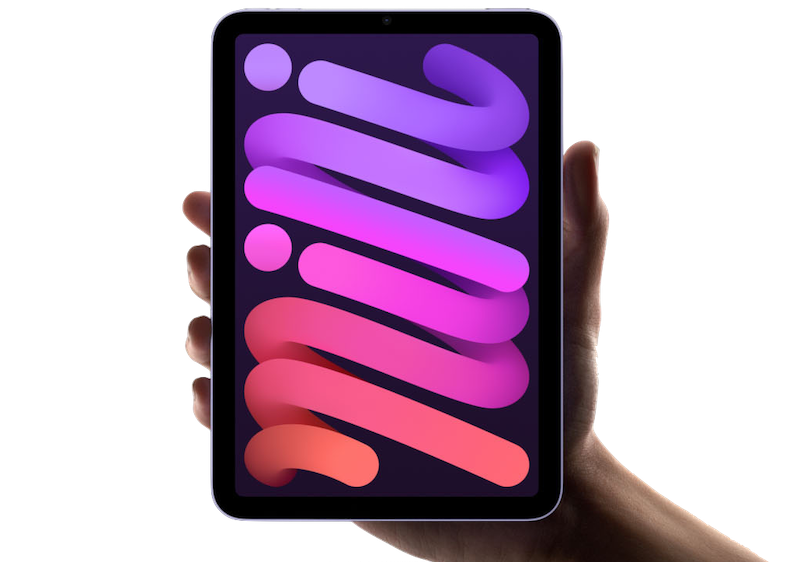
Should You Buy an iPad mini?
The iPad mini is Apple's smallest tablet device and the latest model features a slim-bezeled design, the A15 Bionic chip, a USB-C port, Apple and Pencil 2 support.
Introduced in September 2021, the iPad mini is one of the oldest iPads in Apple's lineup and it is approaching the end of its product cycle. Apple does not seem to update the iPad mini regularly, leaving up to two and a half years between upgrades. A new model is expected in March 2024. As the iPad mini is now 18 months old and a new model is in development, those who want the latest hardware should wait for a refresh to buy.
We are not expecting major design changes to be introduced with the next iPad mini refresh, and Apple will likely focus on introducing a new chip and perhaps adding other minor tweaks to the camera. For this reason, if you need an iPad mini now and don't care about having the latest technology, now is still an okay time to buy.
While the iPad mini is Apple's smallest iPad for those who want features like an all-screen design and USB-C in the most portable form factor, users who are looking for a more affordable option should consider the ninth-generation iPad. Starting at $329, the iPad offers many iPad mini features, such as Touch ID and Center Stage, but at a lower price that balances functionality and affordability.
On the other hand, for an iPad with a larger display, there is the $459 10th-generation iPad or $599 iPad Air. The iPad Air features a Smart Connector on its rear to connect to keyboard cases and its larger, 10.9-inch display is better for productivity tasks and media consumption.
Before buying, check out our iPad deals guide, where we keep track of the current best price on the iPad mini, iPad Air, iPad, and iPad Pro.
The iPad mini 6
Contents
Apple introduced the sixth-generation iPad mini in September 2021, two and a half years after the introduction of the previous model fifth-generation , featuring a complete redesign with a larger display, no Home button, the A15 Bionic chip, and a USB-C port.
The iPad mini mirrors the design of the iPad Air with an all-screen design, squared-off edges, and a Touch ID fingerprint scanner in the top power button. The main differences from the iPad Air are the lack of a Smart Connector on the rear and that the volume buttons have been relocated to the top edge of the device. Compared to the prior-generation model, the new iPad mini lacks a Touch ID Home button.
The iPad mini features a larger, 8.3-inch Liquid Retina display with a resolution of 2,266 by 1,488. The display continues to feature True Tone and P3 wide color, and offers up to 500 nits of brightness.
It is equipped with the A15 Bionic chip, which is a chip that Apple first used in the iPhone 13 lineup, for up to 80 percent better performance than the previous iPad mini. Cellular iPad mini models also can now connect to 5G for the first time.
There is an improved 12MP Wide rear camera with an ƒ/1.8 aperture and the front-facing camera also gets a major upgrade, with a 12MP Ultra Wide camera, featuring Center Stage for video calls.
The sixth-generation iPad mini supports the second-generation Apple Pencil, which magnetically attaches to the side of the tablet for storage, pairing, and charging. It features the same all-day battery life as other iPads, lasting up to around 10 hours.
The iPad mini comes in three new colors, including Pink, Starlight, and Purple, in addition to Space Gray from previous years.
The iPad mini is available to order now and starts at $499 for the 64GB Wi-Fi-only model, going up to $649 for the 256GB model. Cellular models are available for $150 more over the base price of each configuration. The second-generation Apple Pencil that works with the iPad mini is available for $129.
Note: See an error in this roundup or want to offer feedback? Send us an email here.Reviews
Reviews of the iPad mini have been very positive, praising the slimmer bezels, a USB-C port, a Touch ID power button, a 12-megapixel rear Wide camera, and second-generation Apple Pencil compatibility.
Even with its larger 8.3-inch display, the new iPad mini maintains portable convenience, according to Engadget's Valentina Palladino, although typing was not a particularly comfortable experience. MacStories editor-in-chief Federico Viticci said that the iPad mini delivers on "my longstanding dream of an iPad Pro/Air-like device in a diminutive form factor, providing a highly portable experience unlike anything else in Apple's lineup."
WIRED's Brenda Stolyar expressed some concerns about battery life, saying that the iPad mini struggles with a large amount of activity, achieving around five hours, which is significantly less than the advertised 10 hours.
For more thoughts on the iPad mini, see our review roundup or collection of unboxing videos.
Design
With the launch of the sixth-generation iPad mini, Apple completely overhauled the design, and now the smallest tablet in the iPad lineup resembles a diminutive version of the iPad Air. The prior version of the iPad mini had thick bezels and a Touch ID Home button, but the new model does away with those in favor of an all-display design.
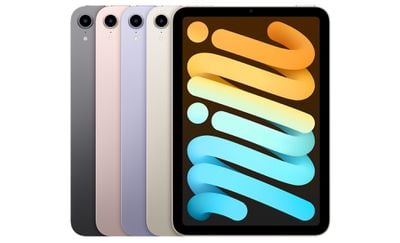
The iPad mini 6 features an 8.3-inch display, which is larger than the 7.9-inch iPad mini 5's thanks to the reduction of the bezels around the screen. There is no Home button, so Touch ID has been moved to the power button at the top of the device.
Like the iPad Air, the iPad mini 6 has a body with flat, rounded edges that wrap around the display, with the flat-edged design matching the iPad Pro and modern iPhones. There's a small bezel all around the iPad mini's display, but it's thinner than the prior design at the top and bottom.

The iPad mini measures in at 7.69 inches (195.4 mm) long, 5.3 inches (134.8 mm) wide, and 0.25 inches (6.3 mm) thick, so it's about the same width and height as the prior model, but it's 0.2 mm thicker. While the iPad mini 5 had a headphone jack, the iPad mini 6 does not.
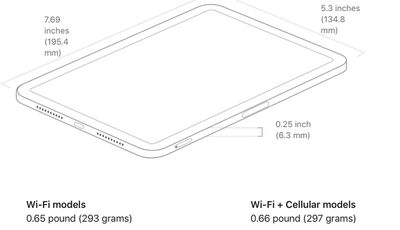
As for weight, the iPad mini is Apple's lightest and smallest tablet, weighing in at 293 grams or 0.65 pounds. Cellular models are just a few grams heavier due to the extra hardware.
The volume buttons have been moved to the top of the device, which is a first for an iPad. The volume buttons are at the top to leave space for a magnetic connector at the side that's used to charge the second-generation Apple Pencil.
There are speakers at the top and bottom of the iPad mini that provide stereo sound when the iPad mini is used in landscape mode, along with a microphone at the top, and cellular models have a nano-SIM tray on the side. At the back, there's a single-lens rear camera.
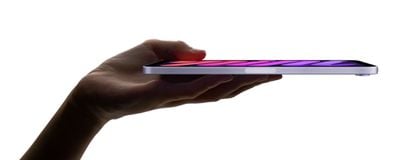
The iPad mini 6 comes in Space Gray, Pink, Purple, and Starlight, a color that's a hybrid between silver and gold.
Touch ID Power Button
The Touch ID power button located at the top of the iPad mini works just like the Touch ID Home button that was available on the iPad mini 5, simply requiring you to rest your finger on it to register your fingerprint.
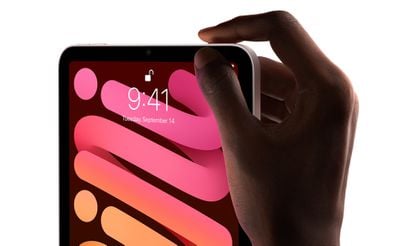
Touch ID can be used to unlock the iPad, access apps, make purchases with Apple Pay, and more. Touch ID on the iPad mini 6 works in both portrait and landscape orientations.
Holding down on the Touch ID power button allows it to double as a button for activating Siri.
USB-C
Apple has added a USB-C port at the bottom of the tablet to replace the Lightning port, bringing the iPad mini in line with the iPad Air and iPad Pro. With the USB-C port, the iPad mini can be connected to 4K and 5K displays, cameras, and other USB-C devices. The USB-C port supports 5Gbps data transfer and is able to charge an iPhone or Apple Watch with the proper cable.
Display
The iPad mini 6 features an 8.3-inch fully laminated display with a 2266x1488 resolution at 326 pixels per inch. Like the iPad Air, the iPad mini 6 supports Wide color for vivid, true-to-life colors, and it comes with True Tone support.
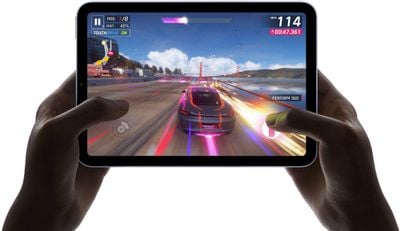
True Tone adjusts the white balance of the display to match the ambient lighting to make the screen easier on the eyes. If you're in a room with more yellow lighting, for example, the iPad mini's display turns warmer in color to avoid a stark contrast between the color of the iPad and the lighting in the room.
There's also an antireflective coating, and the iPad mini 6 features 1.8 percent reflectivity and 500 nits brightness. Like all iPads, it has a fingerprint-resistant oleophobic coating.
Apple Pencil
The prior-generation iPad mini 5 was compatible with the first-generation Apple Pencil, but the updated iPad mini 6 works with the second-generation Apple Pencil that's also compatible with the iPad Air and the iPad Pro.
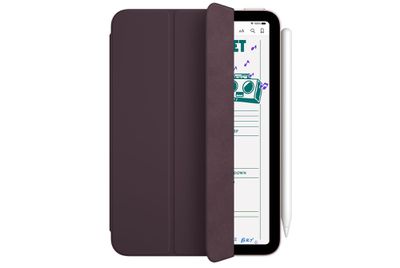
A magnetic strip on the side of the iPad mini 6 allows the Apple Pencil 2 to connect to the device and to charge while it's connected.
A15 Bionic Chip
The iPad mini 6 is equipped with the same 6-core A15 chip that's in the iPhone 13 models, but it is downclocked to 2.9GHz compared to the 3.2GHz speeds available in the iPhone 13 lineup.
The downclocked chip means the iPad mini is around two to eight percent slower than the iPhone 13 when it comes to CPU performance. In Geekbench tests, the iPad mini 6 has average single-core and multi-core scores of 1,595 and 4,540, respectively. The iPhone 13 sees average single-core and multi-core scores of 1,730 and 4,660, respectively.
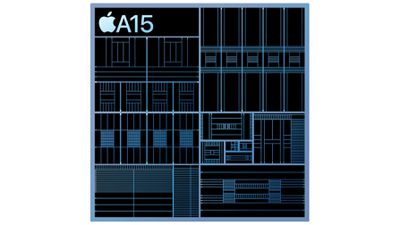
Though the chip is not as fast as the chip in the iPhone 13, it is much more powerful than the chip in the prior-generation iPad mini. The iPad mini 6 offers up to 40 percent faster single-core performance and 70 percent faster multi-core performance than the A12 in the prior-generation iPad mini 5.
There are two versions of the A15 chip, one with a 4-core GPU and one with a 5-core GPU. The iPad mini has the 5-core version, which is the same faster and more powerful chip used in the iPhone 13 Pro models. Compared to the prior-generation iPad mini, the iPad mini 6 offers 80 percent faster graphics.
Neural Engine
The 16-core Neural Engine in the A15 is able to perform up to 15.8 trillion operations per second, and it powers features like Cinematic Mode and Smart HDR 3 thanks to the image signal processor.
RAM
The redesigned iPad mini has 4GB RAM, up from 3GB in the prior-generation model. That's the same amount of RAM that's available in the iPad Air.
Storage Space
The base iPad mini includes 64GB of storage, and a 256GB upgrade is available. There is no 128GB version.
Rear Camera
The iPad mini 6 includes a single ƒ/1.8 12-megapixel wide-angle rear-facing camera with digital zoom up to 5x, a five-element lens, and quad-LED True Tone flash. It's an adequate camera and the same camera that's included with the iPad Air, but it's not as advanced as the cameras used in the iPhone 13 lineup or the iPad Pro.

Most of Apple's modern camera features are supported, such as panoramas, Burst Mode, Smart HDR 3, Live Photos, autofocus with Focus Pixels, wide color capture, auto image stabilization, and more.
4K video recording is supported at 24, 25, 30, or 60 frames per second, as is slo-mo video at 120 or 240 frames per second. The iPad mini can also record in 1080p at 30 or 60 frames per second, and it supports continuous autofocus, cinematic video stabilization, and time-lapse video with stabilization.
Front-Facing Camera and Center Stage
There's also a front-facing FaceTime HD camera with an ƒ/2.4 aperture and a 122 degree field of view. The front-facing camera has the same features as the rear camera, but it also supports Center Stage, a FaceTime feature that Apple first introduced with the iPad Pro.

Center Stage is designed to keep you in focus and perfectly framed when you're on a FaceTime video call. The wide-angle front-facing camera shows more of the room that you're in, while the A15 works to keep you front and center even as you move around.
If more than one person is participating in the call, the camera zooms out to attempt to keep everyone in view and make sure they're part of the conversation. Though designed with FaceTime in mind, Center Stage also works with other third-party video apps like Zoom.
Battery Life
The iPad mini 6 is equipped with a 19.3-watt-hour battery, which is the same battery that was included in the previous-generation iPad mini.
According to Apple, the battery lasts for up to 10 hours when surfing the web on WiFi or watching video, while cellular models last for up to nine hours of surfing the web on a cellular connection.
Connectivity
The sixth-generation iPad mini includes a 5G chip that allows it to connect to 5G networks, but unlike the 5G iPhone models for the United States, it does not support the fastest mmWave 5G networks. Instead, it is limited to the slower but more widespread Sub-6GHz networks.
mmWave 5G networks are the fastest 5G networks, but mmWave is short-range and can be obscured by buildings, trees, and other obstacles, so its use is limited to major cities and urban areas along with venues like concerts, airports, and other places where a lot of people congregate.
Sub-6GHz 5G is much more widely available and available in urban, suburban, and rural areas across the United States and other countries. For the most part, when you use a 5G network, you'll be using Sub-6GHz 5G, and at this point in time, mmWave connectivity won't be missed because of its limited availability.
Cellular iPad mini 6 models are compatible with the following bands: n1, n2, n3, n5, n7, n8, n12, n20, n25, n28, n29, n30, n38, n40, n41, n48, n66, n71, n77, n78, n79.
LTE connectivity is also available and the iPad mini is compatible with FDD-LTE bands 1, 2, 3, 4, 5, 7, 8, 11, 12, 13, 14, 17, 18, 19, 20, 21, 25, 26, 28, 29, 30, 32, 66, and 71 along with TD-LTE bands 34, 38, 39, 40, 41, 42, 46, and 48.
Those with a cellular iPad mini can use the nano-SIM slot or eSIM capabilities.
Bluetooth and WiFi
The iPad mini 6 supports 802.11ax WiFi 6 and Bluetooth 5.0 technology.
Other Features
The iPad mini is equipped with a three-axis gyroscope, an accelerometer, a barometer, and an ambient light sensor.
How to Buy
The iPad mini can be purchased from the online Apple Store and Apple retail stores. The 64GB iPad mini is available for $499, while the 256GB model costs $649.
The WiFi and Cellular model with 64GB storage is priced at $649, and the 256GB WiFi and Cellular is available for $799.
As of January 2020, Apple is occasionally offering discounted iPad mini 5 models from its refurbished store. Availability of different capacities and colors varies based on available stock. Refurbished iPad mini 6 models are not yet available.
iPad Buyer's Guide
If you're trying to figure out which iPad is best for you out of Apple's current tablet lineup, make sure to check out our iPad Buyer's Guide, which goes through each of the available options and helps you figure out which iPad will meet your specific needs.
What's Next for the iPad mini
Both Apple analyst Ming-Chi Kuo and Bloomberg's Mark Gurman believe that Apple will release an updated version of the iPad mini in early 2024, perhaps in March.
We are expecting the seventh-generation iPad mini to be updated with a faster chip, likely the A16 Bionic, though the A17 or even an M-series chip is a possibility. Updated 12-megapixel front and rear cameras will be added, and the tablet will also likely get support for Wi-Fi 6E and Bluetooth 5.3, standards that Apple has been adding to recent product updates.
The only other new feature we might see aside from internal upgrades is new colors, but there's no word on which colors Apple will choose.
The iPad mini 7 will allegedly include a rotated screen assembly, and the new positioning will cut down on the "jelly scrolling" effect that some iPad mini owners have complained about. Jelly scrolling is a reference to screen tearing, which causes text or images on one side of the display to appear to be tilted downward because of mismatched refresh rates. According to Apple, screen tearing is normal behavior for LCD iPads.
After bringing OLED technology to the iPad Pro next year, Apple is rumored to be planning to expand OLED displays to the iPad mini in the future. An iPad mini with an OLED display could be introduced in 2026.

